July 26th, 2022
Many of the most notable and recognizable items from Queen Elizabeth II's jewelry collection — including the breathtaking and historic Diamond Diadem — are now on public display in Buckingham Palace as part of a 10-week exhibition.
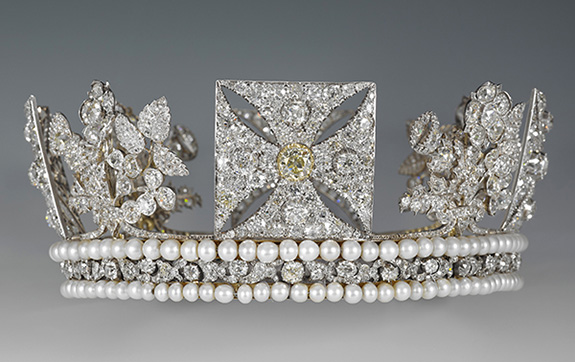
The special presentation titled "Platinum Jubilee: The Queen’s Accession" celebrates the start of the 96-year-old monarch's historic reign and centers upon 24 official portraits of The Queen taken by the photographer Dorothy Wilding, alongside items of jewelry worn by Her Majesty for the portrait sittings. Some of the items are on public display for the first time.
Wilding began taking photographs of members of the Royal Family in the 1920s. In May 1937, she became the first official female royal photographer when she was appointed to take the portraits at the coronation of King George VI and Queen Elizabeth.
Ten years later, in July 1947, Wilding was called upon to capture the official engagement portraits for Princess Elizabeth and Lieutenant Philip Mountbatten, and in February 1952 she was commissioned to take the first official photographs of the new Queen Elizabeth, just 20 days after the Accession.
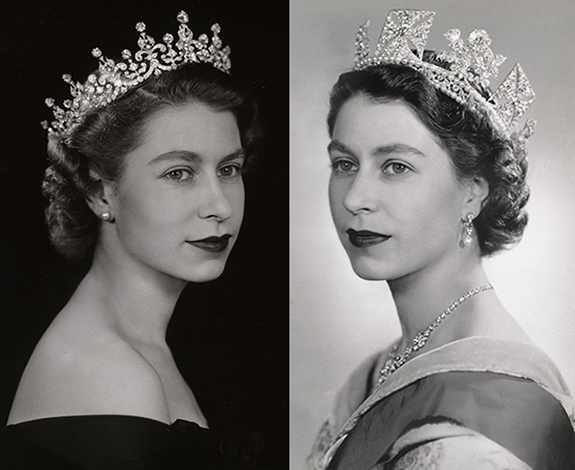
The series of photographs that Wilding took during two sessions in 1952 have become some of the most enduring images of Queen Elizabeth II and many have formed the basis for the profiles and silhouettes that we see on stamps and coins to this day.
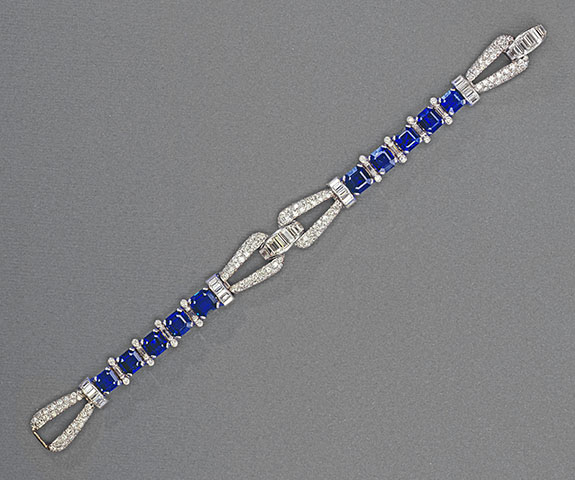
Among the amazing jewelry items on display is a sapphire and diamond Cartier bracelet, which was given to Elizabeth by her father, King George VI, on her 18th birthday in 1944.
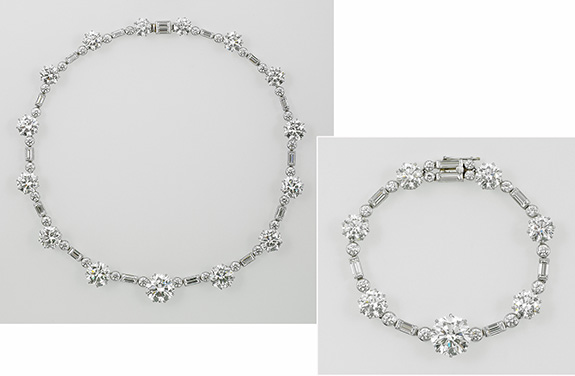
Another birthday gift was the South Africa necklace, given to Princess Elizabeth for her 21st birthday by the Government and Union of South Africa. The necklace originally consisted of 21 brilliant-cut diamonds, but in 1952 it was shortened. The six removed stones were made into a matching bracelet, which is also be on display.
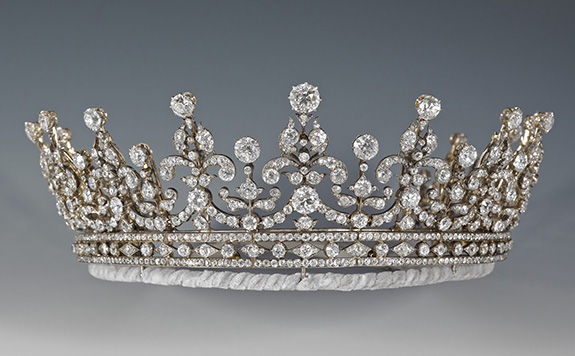
One of Her Majesty’s most recognizable jewels is The Girls of Great Britain and Ireland Tiara. The diamond tiara was a gift to the future Queen Mary, on the occasion of her marriage to the future King George V in 1893.
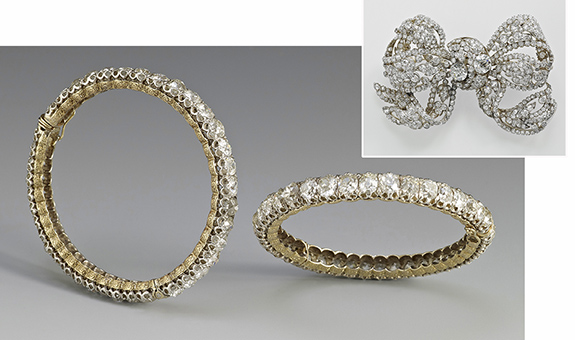
Queen Mary, in turn, gave the tiara as a wedding present to her granddaughter, Princess Elizabeth, in November 1947, along with the Dorset Bow Brooch and a pair of diamond bangles. The bangles, which are on display for the first time, are thought to have been made in India, where traditionally one would be worn on each wrist to signify matrimony.
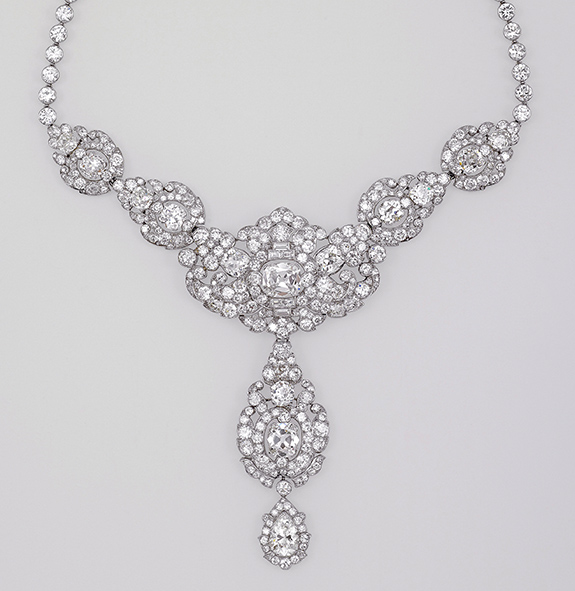
Another wedding gift was the Nizam of Hyderabad necklace. The Nizam (ruler) of Hyderabad had instructed Cartier in London to allow Princess Elizabeth to select a wedding gift herself. This platinum necklace set with approximately 300 diamonds was what she chose. The Queen wore the necklace for her second sitting with Dorothy Wilding in April 1952, and it was these photographs that were chosen to form the basis of Her Majesty’s image on postage stamps from 1953 until 1971.
According to The Royal Collection Trust, the second sitting was coordinated so that additional portraits could be taken of The Queen wearing a coronet, as this was deemed to be more appropriate for official use on coins and postage stamps.
A crown could not be worn because the official Coronation was not to take place until June 2, 1953, so the Diamond Diadem (top photo) was selected. Originally created for George IV’s extravagant coronation in 1821 and set with 1,333 brilliant-cut diamonds, the Diamond Diadem was worn by The Queen on the day of her Coronation and has been worn by Her Majesty on her journey to and from the State Opening of Parliament since the first year of her reign.
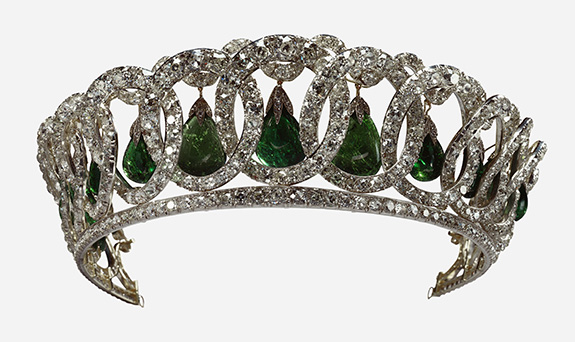
The Queen’s final sitting with Dorothy Wilding took place in May 1956, shortly before Wilding retired. The Queen is shown wearing the Vladimir Tiara, which was made for Grand Duchess Vladimir of Russia around 1874 and sold by her daughter to Queen Mary in 1921.
Inherited by The Queen in 1953, the tiara is unusual in that it can be worn in a variety of ways, as its pendant emeralds can be removed or substituted for pearls.
“The Platinum Jubilee: The Queen’s Accession” runs through October 2, 2022.
Credits: Images courtesy of Royal Collection Trust / © All Rights Reserved.

The special presentation titled "Platinum Jubilee: The Queen’s Accession" celebrates the start of the 96-year-old monarch's historic reign and centers upon 24 official portraits of The Queen taken by the photographer Dorothy Wilding, alongside items of jewelry worn by Her Majesty for the portrait sittings. Some of the items are on public display for the first time.
Wilding began taking photographs of members of the Royal Family in the 1920s. In May 1937, she became the first official female royal photographer when she was appointed to take the portraits at the coronation of King George VI and Queen Elizabeth.
Ten years later, in July 1947, Wilding was called upon to capture the official engagement portraits for Princess Elizabeth and Lieutenant Philip Mountbatten, and in February 1952 she was commissioned to take the first official photographs of the new Queen Elizabeth, just 20 days after the Accession.

The series of photographs that Wilding took during two sessions in 1952 have become some of the most enduring images of Queen Elizabeth II and many have formed the basis for the profiles and silhouettes that we see on stamps and coins to this day.

Among the amazing jewelry items on display is a sapphire and diamond Cartier bracelet, which was given to Elizabeth by her father, King George VI, on her 18th birthday in 1944.

Another birthday gift was the South Africa necklace, given to Princess Elizabeth for her 21st birthday by the Government and Union of South Africa. The necklace originally consisted of 21 brilliant-cut diamonds, but in 1952 it was shortened. The six removed stones were made into a matching bracelet, which is also be on display.

One of Her Majesty’s most recognizable jewels is The Girls of Great Britain and Ireland Tiara. The diamond tiara was a gift to the future Queen Mary, on the occasion of her marriage to the future King George V in 1893.

Queen Mary, in turn, gave the tiara as a wedding present to her granddaughter, Princess Elizabeth, in November 1947, along with the Dorset Bow Brooch and a pair of diamond bangles. The bangles, which are on display for the first time, are thought to have been made in India, where traditionally one would be worn on each wrist to signify matrimony.

Another wedding gift was the Nizam of Hyderabad necklace. The Nizam (ruler) of Hyderabad had instructed Cartier in London to allow Princess Elizabeth to select a wedding gift herself. This platinum necklace set with approximately 300 diamonds was what she chose. The Queen wore the necklace for her second sitting with Dorothy Wilding in April 1952, and it was these photographs that were chosen to form the basis of Her Majesty’s image on postage stamps from 1953 until 1971.
According to The Royal Collection Trust, the second sitting was coordinated so that additional portraits could be taken of The Queen wearing a coronet, as this was deemed to be more appropriate for official use on coins and postage stamps.
A crown could not be worn because the official Coronation was not to take place until June 2, 1953, so the Diamond Diadem (top photo) was selected. Originally created for George IV’s extravagant coronation in 1821 and set with 1,333 brilliant-cut diamonds, the Diamond Diadem was worn by The Queen on the day of her Coronation and has been worn by Her Majesty on her journey to and from the State Opening of Parliament since the first year of her reign.

The Queen’s final sitting with Dorothy Wilding took place in May 1956, shortly before Wilding retired. The Queen is shown wearing the Vladimir Tiara, which was made for Grand Duchess Vladimir of Russia around 1874 and sold by her daughter to Queen Mary in 1921.
Inherited by The Queen in 1953, the tiara is unusual in that it can be worn in a variety of ways, as its pendant emeralds can be removed or substituted for pearls.
“The Platinum Jubilee: The Queen’s Accession” runs through October 2, 2022.
Credits: Images courtesy of Royal Collection Trust / © All Rights Reserved.


